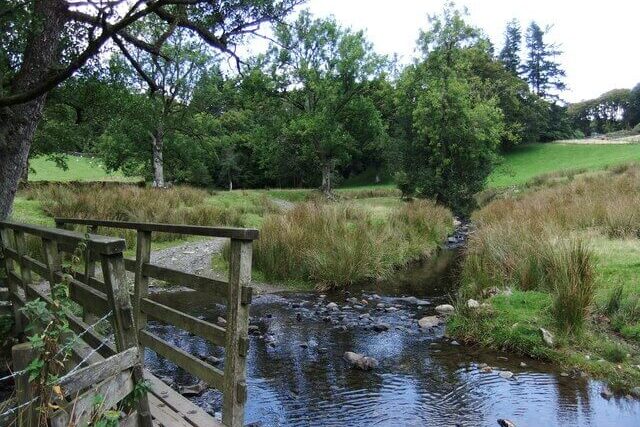
A conservation charity has raised concerns over a “huge” loss in insect populations in streams due to sewage discharges, particularly in the vicinity of waste water treatment plants.
Wildfish conducted a survey of five streams that flow into Windermere in Cumbria, noting a loss of wildlife downstream of these plants.
The Save Windermere campaign said “everything up the food chain gets impacted” when insects disappear.
United Utilities, responsible for operating the treatment plants, stated compliance with environmental permits while expressing that they are “committed to going further and doing more”.
The Environment Agency has initiated a review of permits for the lake to explore additional measures.
The Far Sawrey waste water treatment works, located on the bank of Wilfin Beck, demonstrated a notable 75% decline in river fly numbers downstream.
Surveyors employed the three kick sampling method, revealing a 50% decline in spring and a staggering 100% decline in autumn insect populations.
Similarly, observations downstream of the Near Sawrey works at Cunsey Beck unveiled a substantial 76% reduction in river fly numbers compared to upstream habitats.
Matt Staniek from the Save Windermere Campaign said: “We have data to show [pollution] is actively damaging that lower level of the food chain.
“It then starts impacting the fish, which impacts the kingfishers, the otters, the herons.
“Everything up the food chain then gets impacted when we start seeing these insects disappearing and that’s exactly what’s happening here in a UNESCO World Heritage site and a National Park in what should be the most idyllic place for nature in the entire UK.”
In a statement, United Utilities said: “Our treatment plants at Near Sawrey and Far Sawrey are two of our smallest sites servicing a population of 370 people which is around 2% of the Windermere catchment.
“Both plants operate in line with their environmental permits but we are committed to going further and doing more.
“We’ve already started investing a further £41m at our sites around Windermere and we working with the Love Windermere Partnership to address all sources of lake pollution including private sewage systems, highways run off and pollution from land.”
United Utilities has raised questions about the data selection process undertaken by Wildfish, prompting further scrutiny.
Additional surveys conducted by Wildfish on the River Brathay, River Rothay, and Ford Wood Beck corroborate these findings.
The Save Windermere Campaign criticised the Environment Agency for inadequate monitoring of the streams.
An Environment Agency spokesperson said: “The current monitoring network in the Windermere catchment is one of the most extensive in the country.
“We monitor 24 locations for water quality, we have 28 sample locations and the largest number of sondes in a geographical area in England to measure changes in water quality.
“We are committed to further improving the water quality in Lake Windermere and are working closely with several organisations as part of the Love Windermere Partnership to do so.
“As part of this work, we have started the process of reviewing all the permits for this Lake to identify whether there is any further action we can take.”
In response, Wildfish plans to engage local residents in ongoing surveys to monitor insect abundance in the water, highlighting the collaborative effort required to address the ecological challenges facing these vital aquatic ecosystems.
——————————————————————————
At Natural World Fund, we are passionate about stopping the decline in our wildlife.
The decline in our wildlife is shocking and frightening. Without much more support, many of the animals we know and love will continue in their decline towards extinction.
When you help to restore a patch of degraded land through rewilding to forests, meadows, or wetlands, you have a massive impact on the biodiversity at a local level. You give animals a home and food that they otherwise would not have had, and it has a positive snowball effect on the food chain.
We are convinced that this is much better for the UK than growing lots of fast-growing coniferous trees, solely to remove carbon, that don’t actually help our animals to thrive.
This is why we stand for restoring nature in the UK through responsible rewilding. For us, it is the right thing to do. Let’s do what’s right for nature!
Donate today at https://naturalworldfund.com/ and join in the solution!

